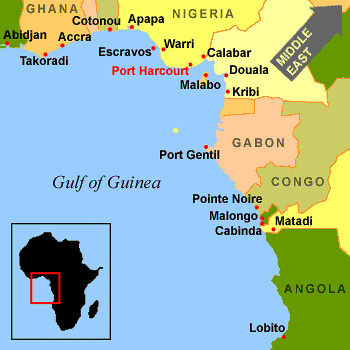
A map of the Gulf of Guinea off the coast of West Africa. There have been US military maneuvers in this region amid reports of so-called 'piracy attacks' of ships., a photo by Pan-African News Wire File Photos on Flickr.
UN Security Council Debates Piracy for First Time
By PETER JAMES
UNITED NATIONS
UN Security Council debates piracy for first time as international peace and security issue
The Associated Press
Centuries after piracy was recognized as the first international crime against humanity, the U.N. Security Council held its first debate Monday on piracy's rise as a threat to world peace and security. It's a big business, with pirates raking in an average of $5 million in ransom for each seized ship, costing the maritime industry at least $6.6 billion a year in extra security costs.
In the past, the council has focused on regional piracy outbreaks such as those off the coast of Somalia, in the Gulf of Guinea off West Africa and in Southeast Asia.
Monday's debate was called by Indian Ambassador Hardeep Singh Puri, who holds the council presidency this month. Seven percent of all maritime workers are Indian nationals, and many have been taken hostage. Puri said 43 Indian citizens are being held hostage by pirates.
Piracy is ebbing off Somalia this year, according to a report to the council by Secretary-General Ban Ki-moon, which attributed the Somali success to "actions by naval forces both at sea and ashore to disrupt pirate operations,"and, "better application of self-protection measures and situational awareness by merchant ships," among other things.
U.N. Deputy Secretary-General Jan Eliasson said countries fighting piracy need better coordination and information-sharing, and he called for stronger prosecution of apprehended pirates. He also called for an international agreement on rules for posting private armed security guards on merchant ships.
U.S. Ambassador Susan Rice told the council that no ship carrying armed guards has been successfully attacked by pirates. But posting armed guards on ships is controversial. Russian and Italian military crews assigned to merchant ships have fired on and killed fishermen off Somalia, mistaking them for pirates approaching to board.
French Ambassador Gerard Araud stressed that private guards do not have the deterrent effect that government-posted marine and sailors and naval patrols have in warding off attacks. Araud also said that 80 percent of captured pirates are released without prosecution, so a more robust system of trial and justice is required.
Ban's report said the campaign against Somali piracy has had "initial success, with the latest reports from the International Maritime Organization showing a sharp decline in pirate attacks and hijackings in 2012 compared with 2011."
In the first nine months of 2012, it tallied 99 attacks on ships in waters off Somalia, resulting in the hijacking of 13 ships. This compares with 269 reported attacks and 30 ships hijacked during the same period in 2011, the report said.
"However, piracy continues to pose a serious threat, since 224 seafarers and 17 vessels (including three fishing vessels and eight dhows) were held hostage as at late September 2012. This compares with 339 people and 16 vessels (including four fishing vessels and two dhows) held in September 2011," Ban's report said.
More than 20 countries' navies have captured hundreds of pirates off Somalia, leading to problems over what to do with the prisoners. Some have been freed on the Somali coast.
The Netherlands proposed the creation of a regional U.N. piracy tribunal several years ago to take the burden until Somalia's government is functional enough to take over. But the idea has been dormant due to lack of Security Council interest.
The United Nations Office on Drugs and Crime said that Somali pirates reportedly received about $170 million in ransom in 2011 for hijacked vessels and crews, up from $110 million in 2010. The average payment made to pirates in 2011 was about $5 million, although as much as $10 million was paid for the release of a tanker.
Ban's report quoted a study by the think tank One Earth Future Foundation as putting the economic cost of Somali piracy in 2011 as between $6.6 and $6.9 billion for increased insurance premiums, ships cruising at faster speeds over longer routes to avoid pirates, hiring of privately contracted armed security personnel and equipment, ransom payments and higher labor charges. Shipping companies absorb 80 percent of the excess costs, and governments 20 percent.
No comments:
Post a Comment